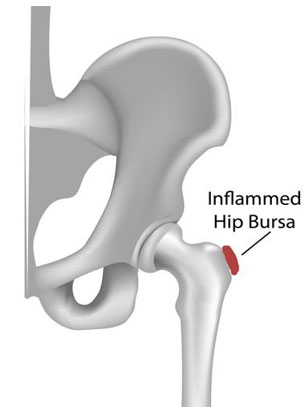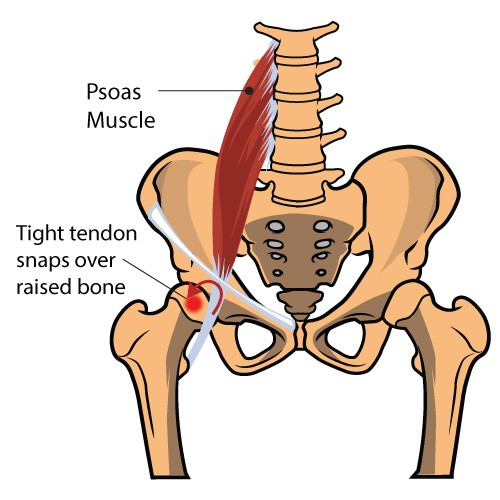Hip Pain or Bursitis
The broad diagnosis of “greater trochanteric pain syndrome” (GTPS) describes an uncomfortable collection of problems affecting the outermost portion of your hip. GTPS can include swelling of one or more of the fibrous tendons that attach your muscles onto your hip–a condition called “tendonitis.” One of the most common causes of hip pain is a condition called “hip bursitis” which means that one or more of your bursas have become painfully inflamed. Besides bursitis & tendonitis, GTPS may originate from tightness in the muscle that travels over your hip en route to your knee – resulting in compression and irritation to your hip.
Greater trochanteric pain syndrome is most common in middle age to elderly adults and is 2-4 times more common in females. Sometimes the problem affects both hips at the same time. Approximately 1/3 of patients with GTPS have lower back pain, and patients who have arthritis in their hips and knees are more likely to suffer from ongoing complaints.
Symptoms typically include persistent pain on the outside of your hip, buttock, and upper thigh. Your discomfort may be aggravated by sitting with your leg crossed, arising from a seated position, prolonged standing, climbing stairs, and high-impact activities, like running. Sometimes patients find it difficult to sleep, as lying on the painful hip usually increases symptoms.
For adults, x-rays may or may not be needed to confirm the diagnosis, but children and adolescents usually require films to rule out more serious childhood diseases. Be sure to tell your doctor if you notice that you have a fever, leg numbness, pain radiating significantly beyond your knee, or pain in the front of your groin crease (the area where your leg meets your pelvis.)
Conservative treatment, like the type provided in this office, is successful in about 90% of GTPS cases. Our office offers a variety of treatments, including chiropractic, acupuncture, and

Snapping / Clicking Hip or Hip Flexor Pain
One muscle responsible for flexing your hip toward your trunk is the Psoas. This muscle begins on your lower spine and passes through your pelvis to attach to the top of your femur (thigh bone). Along this course, the muscle travels across the front of your hip socket and over several bony prominences. If the muscle is too tight, its tendon may rub over these “bumps”. This occasionally produces an audible snapping sound, hence the moniker, “snapping hip”, aka “psoas tendinopathy”.
The tendon can be irritated by an acute injury, but more commonly from overuse- particularly repeatedly flexing your hip toward your trunk. The condition is also known as “dancer’s hip” or “jumper’s hip”, as movements associated with these activities are often culprits. Likewise, the condition can be seen in athletes who take part in rowing, track and field, hurdling, running (especially uphill), soccer, and gymnastics.
Your symptoms may include a “snapping” sound or sensation when you flex and extend your hip- although many cases are silent. Repeated rubbing causes inflammation and subsequent deep groin pain that can radiate to the front of your hip or thigh. Long-standing problems can trigger weakness or even limping. Low back pain is often a common symptom because of a weak and tight psoas and hip. The diagnosis of snapping hip is often overlooked. Fortunately, our office is skilled and finding and treating this condition effectively.
Credit: Information on this page provided by ChiroUp.

I really love it here! They are very friendly and I feel Dr. Wilson is giving me great treatment! I also don’t feel pressured into coming back too frequently. The adjustments are great! Great office!
Very professional and in depth consultation. These people seem to genuinely care about people’s health and progress.
Dr. Matt has done wonders for me and I recommend him highly – I can’t say enough good things about him. Dr. Matt and staff are good people and will take great care of you.
My family have used chiropractic and physical therapy services here and every one of us have had excellent outcomes. I wouldn’t go anywhere else these folks are as good as it gets.
Dr. Matthew squeezed me in on short notice and took very good care of me. He was very thorough and didn’t just adjust me and let me walk out. Amazing experience here and the receptionist is a sweetheart.
Dr. Matt and the entire staff have been GREAT! I went in for some issues I was having with my neck and back and Dr. Matt also helped me with some other issues I was having with my calf and shoulders that have made a HUGE improvement in my overall health and comfort.
I highly recommend using Dr. Matt!
